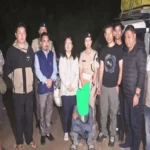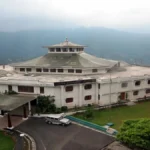Gangtok, Sikkim: As the mist rolled over the hills of Paljor Stadium on May 16, 2025, thousands of fans stood in anticipation. The air was thick with excitement, not just for the music, but for a moment that bridged decades of history. Lucky Ali, the iconic voice behind 90s classics like O Sanam and Ek Pal Ka Jeena, took the stage for his first-ever performance in Sikkim. The occasion? The state’s 50th anniversary of becoming part of India.
For many, this wasn’t just a concert. It was a homecoming for Lucky Ali, who compared Gangtok to his childhood home in Mussoorie, and for Sikkim, a state celebrating its journey from a Himalayan kingdom to a model of organic living and education.
From Mussoorie to Gangtok: Lucky Ali’s Himalayan Connection
Lucky Ali, born Maqsood Mahmood Ali, spent his school years in Mussoorie, a hill station much like Gangtok. When he arrived in Sikkim’s capital, he was struck by the familiarity. “The mist rising into the hills, the clean streets—it reminds me of my early years,” he told reporters before the show.
But the connection goes deeper. The singer, known for his reclusive lifestyle and organic farming, praised Sikkim’s sustainability efforts. Ali highlighted in interviews that the state became India’s first fully organic region in 2016. “I grow my food too,” he said. “Seeing Sikkim’s commitment to organic living is inspiring.”
Why This Concert Mattered: 50 Years of Sikkim’s Statehood
After years as a protectorate, Sikkim officially became India’s 22nd state on May 16, 1975. Since then, it has transformed into one of the country’s most progressive regions, leading in literacy, eco-tourism, and clean energy.
The government marked the golden jubilee with a week-long celebration, including cultural performances, football tournaments, and Lucky Ali’s headline concert. Chief Minister Prem Singh Golay called the event “a tribute to Sikkim’s past and future.”
The choice of Lucky Ali was symbolic. His music, especially hits like Na Tum Jano Na Hum and Kitni Haseen Zindagi, defined a generation. For many in the crowd, his songs were a soundtrack to their youth, now playing against the backdrop of their homeland’s milestone.
Football, Farming, and a Full-Circle Moment
The concert wasn’t the only highlight of the day. Earlier, Lucky Ali attended the final Sikkim Premier League (SPL) match at Paljor Stadium. A lifelong football fan, he spoke about the importance of grassroots sports. “Tournaments like the SPL give young players a platform,” he said. “It’s how legends are made.”
When he took the stage hours later, the energy was electric. Reports estimate over 15,000 attendees, with fans travelling from neighbouring Nepal and Bhutan. His setlist mixed classics with surprises, including a rare live performance of Safarnama, a song about journeys, fitting for a night about homecoming.
The Bigger Picture: Music, Mountains, and a Lasting Legacy
Beyond the music, the concert reinforced Sikkim’s growing reputation as a cultural hotspot. In recent years, the state has hosted international yoga festivals and adventure sports events, and it is now a major Bollywood-era icon. Tourism officials say bookings spiked 30% in the weeks leading up to the show.
For Lucky Ali, the night was personal. “I’ve performed worldwide, but this felt different,” he said after the show. “The love here is pure, like the mountains.”
As the crowd dispersed into Gangtok’s glowing streets, one thing was clear: this wasn’t just a concert. It was a celebration of identity—for a singer, a state, and everyone who calls the Himalayas home.
What’s Next?
Lucky Ali heads to Pune for his next show on February 15, 2026. Meanwhile, Sikkim’s golden jubilee celebrations continue with film festivals, trekking events, and more.
Did You Know?
- Sikkim was the first Indian state to ban plastic water bottles in 2016.
- Lucky Ali’s father was legendary Bollywood actor-comedian Mehmood.
- Paljor Stadium, where the concert was held, is also a key venue for Sikkim’s football leagues.










